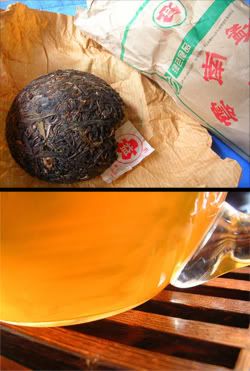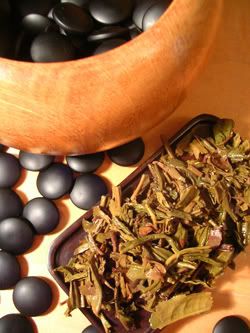A long time ago, I fell in love with the 98 Menghai "Peacock" tuocha, the review of which I'll dig out of my journal archives at some point. It was really fine, and nicely aged. This is broadly similar, being the "Dayi" [great benefit] brand from the same year, and it looks and tastes much like its stablemate.
 This is good news, because I've just bought 2 tubes of this, with 5 tuo in each tube, on the assumption that they would indeed be similar to the peacock that I love so much. They're from the 5000friend eBay store, apparently based in Yixing itself - usually known for an array of teapots (which have been the subject of numerous threads in the rec.food.drink.tea newsgroup).
This is good news, because I've just bought 2 tubes of this, with 5 tuo in each tube, on the assumption that they would indeed be similar to the peacock that I love so much. They're from the 5000friend eBay store, apparently based in Yixing itself - usually known for an array of teapots (which have been the subject of numerous threads in the rec.food.drink.tea newsgroup).Finding these teas is becoming very difficult. Even just a year ago, they used to be available for $10/tuo - decidedly inexpensive. Now, they're hard to find at any price. The ones I've found from other vendors are $30/tuo - a tripling of its price in under one year. 5000friend was selling them at their original $10 price, and so I felt rather obliged to take a few for the cupboard.
According to the tube, they are "jiaji" [first grade], and also bear the "Lu se shi pin" [green-colour food product] logo, which you can just about make out in the top photograph, in the green bar of text. This is a pseudo-organic label from Mainland China - though is uncontrolled, as far as I know.
~15cl Caledonian Springs @ 100C in a 35cl shengpu pot; "normal" amount, ~5g; 1 rinse
Dry leaves:Darkened brown, lighter tips, good leaf integrity. That familiar and welcome Menghai aroma: sweet, earthy. Sociably loose compression, unlike the horrific Xiaguan tuo from recent memory. In the chahe [tea lotus], the aroma is complex, satisfying, and mushroom-like.
10s, 15s, 15s, 15s, more untimed...:
Yellow-orange soup, of a vivid hue, as may be seen above. Cloudy with tip-fur. Long, familiar Menghai beidixiang - so sweet and mushroom-dark. Great patience for an aroma, eventually changing into that lovely sticky-straw lengxiang.
 Smooth texture is the first impression, possibly from the tip-fur. A fine, oleaginous sensation throughout the mouth, with fine patience, before ending in a robust huigan. A touch of its youth about it still, but aged such that the rich background flavours are of similar amplitude to the youthful sweet-bitterness. The classical example of middle-aged tea, and very enjoyable. Sour notes sailing atop the flavour, from lips to throat.
Smooth texture is the first impression, possibly from the tip-fur. A fine, oleaginous sensation throughout the mouth, with fine patience, before ending in a robust huigan. A touch of its youth about it still, but aged such that the rich background flavours are of similar amplitude to the youthful sweet-bitterness. The classical example of middle-aged tea, and very enjoyable. Sour notes sailing atop the flavour, from lips to throat.The chaqi is brisk, and really rather enervating. My mouth is left sour, my nose sweet, my cheeks and tongue delicately-oiled.
Later infusions see a reduction in the smooth texture, presumably due to the decrease in tip-fur as the soup begins to clear. The youth of the tea also becomes apparent after the third infusion, by which point there is more potency than initially encountered.
Used leaves:
The youthful aspect of the tea cannot hide - the leaves are very green. A small grade has been used, quite possibly "jiaji". Significantly chopped.
Overall:
This needs more time, but is enjoyable and has potential. It feels roughly halfway through its middle-age, showing some depth of character, but with its hidden youth becoming evident in later infusions as the richness subsides. Great texture and huigan make this a welcome addition to the store-cupboard for future years.
Addendum:
More notes here...

4 comments:
For those of you who consider buying from the 5000friend EBay store. Be warned that the shipping cost is pretty steep ($30 and more).
Very true - though there seems to be a point approaching reasonableness if one orders several items. As always, factor in the P&P before reckoning your prices.
Toodlepip,
Hobbes
You play go/weiqi? I see you have some nice slate stones there!
-Brent
I can't claim to be a grandmaster, but the game does appeal to me very much. The piece-bowls were from Green-ram Monastery (Qingyang Gong), where (mythically) Laozi disclosed the contents of the Daodejing to the gate-keeper, Yin Xi, before disappearing from the world.
Toodlepip,
Hobbes
Post a Comment